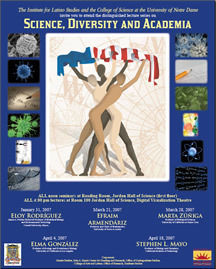
The need for biomedical research scientists to help battle the problem of diabetes among Latinos will be discussed Jan. 31 (Wednesday) in the opening talk of theScience, Diversity and Academiaspring lecture series, sponsored by the Institute for Latino Studies andCollegeofScienceat the University of Notre Dame.
The Universitys first lecture series to present distinguished scholars addressing current research and diversity topics, the event will feature two lectures by each speaker at the Jordan Hall of Science.Anoontalk will be held in the first-floor reading room, and a4 p.m.lecture the same day will take place in the Digital Visualization Theatre, Room 100.
The lectures are as follows:
- Jan. 31 In his first talk, Eloy Rodríguez, the James A. Perkins Endowed Professor in Natural Medicinal Biology and Environmental Toxicology atCornellUniversity, will discussThe Urgent Need for Compassionate Latino/a Biomedical Research Scientists in Combating the Wrath of Diabetes inU.S.Latino/a Communities.Rodríguezsecond lecture is titledChemical Ecology and Biology on Natural Medicines from theAmazoniaand African Rainforests.
p. A tropical explorer and chemical ecologist, Rodríguez conducts field and laboratory research in Africa,India, the Amazon of South America, the Caribbean andMexico, with a focus on chemical medicinals of tropical birds, ants, frogs and plants.
He introduced the concept of zoopharmacognosy, or the process by which wild animalsself-medicate, and also is involved in medicinal herbal chemistry of and for indigenous people worldwide.
- March 21 Efraim Armendáriz, professor and chair of mathematics at theUniversityofTexas, researches various aspects of non-commutative ring theory, with an emphasis on rings satisfying a polynomial identity and generalizations of von Neumann regular rings.
p. Armendáriz established and has received numerous awards for the Emerging Scholars Program, which helps enhance academic success in calculus of mathematics, science, and engineering students from traditionally under-represented groups.He is a member of the Board of Governors of the Mathematical Association of America and chair of the post-doctoral selection panels for the National Science Foundation and Ford Foundation.
- March 28 Martha Zúñiga, a professor in the Department of Molecular, Cellular and Developmental Biology at the University of California, Santa Cruz, studies the cell biology of class I Major Histocompatibility Complex molecules, which alert the immune system to the presence of viruses within cells and play an important role in the rejection of tissue grafts and tumors.In addition to her research, Zúñiga teaches undergraduate and graduate courses in immunology, virology and advanced cell biology.
- April 4 * Elma González *, professor of ecology and evolutionary biology at theUniversityofCaliforniaatLos Angeles(UCLA), studies cell and molecular biology of calcification in coccolithophorid algae.In 2005, she received the UCLA Academic Senate Distinguished Teaching Award, representing the universitys highest attainment of academic and professional excellence.She has taught at UCLA for 30 years, and for nearly 10 of them has served as director of the Minority Access to Research Careers program.
- April 18 ** Stephen L. Mayo is a professor of biology and chemistry at the California Institute of Technology, adjunct professor of molecular biology at the University of Southern California School of Medicine and an associate investigator in thestructural biology section at the Howard Hughes Medical Institute.He is interested in the theoretical, computational and experimental aspects of protein design and folding, focusing on the coupling of theoretical, computational and experimental approaches for the study of structural biology and developing quantitative methods for protein design and stabilization to enzyme design.
p. Mayos honors include a Rita Allen Foundation Scholar Award, David and Lucile Packard Foundation Fellowship, Searle Scholar Award, and the Johnson Foundation Prize for adventurous and innovative research in structural biology. A member of the National Academy of Sciences, he also is a board member of the Minority Affairs Committee of the Biophysical Society.
The lecture series is cosponsored by Notre Dames Gender Studies Program,KanebCenterfor Teaching and Learning, Office of Undergraduate Studies,CollegeofArtsand Letters, and the Office of Research/Graduate Studies.
* Contact: * _Yolanda Lizardi Marino, Institute for Latino Studies, ymarino@nd.edu
_
TopicID: 20883